By Dan McWilliams
The diocese said goodbye to the multifaceted, multitalented, indomitable Mercy Sister Mary Albertine Paulus on Oct. 31 as hundreds gathered at the Cathedral of the Most Sacred Heart of Jesus for her funeral Mass.
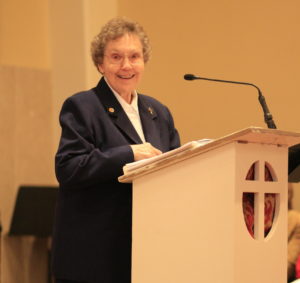 Sister Albertine, founding director of the Office of Evangelization in the earliest days of the Diocese of Knoxville and later the leader of many pilgrimages to the Holy Land and elsewhere, died peacefully Sunday, Oct. 23, at Mercy Convent in Nashville. She was 93 and had served as a Mercy Sister for 73 years.
Sister Albertine, founding director of the Office of Evangelization in the earliest days of the Diocese of Knoxville and later the leader of many pilgrimages to the Holy Land and elsewhere, died peacefully Sunday, Oct. 23, at Mercy Convent in Nashville. She was 93 and had served as a Mercy Sister for 73 years.
Father Jim Vick celebrated her funeral Mass. Concelebrating were Father Tom O’Connell, Monsignor Al Humbrecht, Father Mike Nolan, Father Peter Iorio, Father Michael Woods, Father Jim Haley, CSP, Father Tim Sullivan, CSP, and Father Don Andrie, CSP. Deacon Patrick Murphy-Racey, Deacon Sean Smith, and Deacon Fredy Vargas assisted.
Sister Martha Naber, RSM, a close friend of Sister Albertine, was among several Sisters of Mercy in attendance.
Monsignor Humbrecht, a former cathedral pastor who twice served as diocesan administrator when the Church in East Tennessee was between bishops, was the homilist.
“I stand before you all this afternoon honored and humbled at being asked by the Sisters to preach Sister Albertine’s funeral liturgy,” he said. “I ask your prayers as I attempt to share some reflections on the Word and how that Word was lived so beautifully in the life of Sister Albertine. When Sister Martha asked me to do this, I said to Sister Martha, ‘Sister, I have plenty of Sister Albertine stories that I could tell, but I also have those I can’t tell.’”
Monsignor Humbrecht began by quoting Shakespeare’s Julius Caesar.
“‘The evil that men do lives after them. The good is oft interred with their bones.’ That may be true in a few cases, but in most instances Mark Antony is wrong,” he said. “The good that we do is not interred with our bones. Good acts are like the rays of the sun. They give life and hope to those around us. The author of the Book of Wisdom uses the image that the souls of the just ‘shall shine and dart about as sparks through stubble.’ Sister Albertine’s good actions influenced the people that she touched and made their world a better place in which to live. The good she did surely lives on after her. That good is known to each person who was fortunate enough to have known Sister.”
The monsignor also quoted the day’s second reading from Romans 14.
“St. Paul wrote to that young Church in Rome that ‘none of us lives for oneself, and no one dies for oneself, for if we live, we live for the Lord, and if we die, we die for the Lord, so that whether we live or die, we are the Lord’s,’” he said. “I believe that in her response to her vows, Sister Albertine not only lived for the Lord, but she also died to herself, so that in living and dying with the Lord throughout her life, she was the Lord’s.
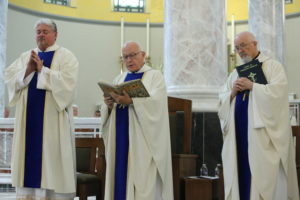
Father Jim Vick, center, pastor of St. Bridget Parish in Dayton, celebrates the funeral Mass for Sister Albertine Paulus, RSM. Monsignor Al Humbrecht, right, pastor of Holy Spirit Parish in Soddy-Daisy, concelebrated the Mass. Deacon Sean Smith, Diocese of Knoxville chancellor, assisted in the Mass.
“That same attitude is reflected in the “Suscipe of Mother Catherine McAuley” that is so dear to each of the Sisters of Mercy: ‘My God, I am yours for time and for eternity. Lord, I am yours forever.’ Sister Albertine lived that suscipe day in and day out. Sister spent 32 years teaching in Catholic schools, but she really remained a teacher throughout her whole life. They say there are two kinds of education: the one that teaches you how to make a living and the one that teaches you how to live. Sister Albertine practiced that second type of education throughout her life.”
Monsignor Humbrecht described Sister Albertine as “real.”
“That was Sister Albertine to every person she encountered, whether it was the Patriarch of Jerusalem or a member of the maintenance staff at the hospital. They were all very real and very important to her,” he said.
Monsignor Humbrecht referred to the day’s Gospel reading about Lazarus and how Martha was basically saying to Jesus, “Where the heck were you?” after she sent for the Lord two days beforehand, her brother Lazarus dying in the meantime.
“I chose that Gospel because I could so easily hear Sister Albertine saying the same thing,” Monsignor Humbrecht said. “Talking with her, and we had so many occasions and so many hours on buses on pilgrimages, one time she said, ‘Maybe I don’t pray enough. I don’t say enough formal prayers, but I talk to Jesus throughout the day.’ And I said, ‘Which is better, that you’re in touch with Him every day, speaking to Him as a friend, as someone important and close in your life?’ I think that’s again a witness that she gave us.”
Sister Albertine “was very accomplished, and everyone here knows that,” and received many awards, Monsignor Humbrecht noted.
“She founded our Office of Evangelization when we became a diocese. Starting from scratch, she burned up the road going from parish to parish, helping get RCIA teams started, feeling comfortable and established,” he said. “I told Sister Beth during the visitation that it dawned on me recently when I was looking at the obituary, and I thought: Mary Albertine Paulus. ‘MAP.’ That certainly fit her, in her travels all over this diocese but also in her pilgrimage travels. She was a great mentor as well. The first time I was elected administrator of the diocese, within that first week Sister Albertine came to me, and she said, ‘All right, I know you’re still full-time pastor of the cathedral, but once a week you need to go down to the Chancery office, and you need to visit every office so they know you appreciate what they are doing.’ And that was Sister, expressing that appreciation for the work being done. Trust me, every week I did that, at least when she was in town.”
Pilgrimages were “another ministry that was so important to her,” the monsignor said.
 “When she organized them, she was always very insistent that it was not a travelogue, it was not a vacation, it was a pilgrimage, a spiritual journey,” he said. “As part of that, she always connected some charitable outreach as part of that pilgrimage. In the Holy Land, she had us all gathering medicine for the clinic in Bethlehem and then school supplies for the school in Jericho, so that we were doing charitable acts while we were on that pilgrimage. Also, I would say almost every pilgrimage that we were on, someone would go to Sister who had been away from the sacraments and would talk to her about coming back to the sacraments. Sister would say to them, ‘What you need to do is invite Father Al out for a glass of wine or a cup of coffee and just talk.’ And that’s how she dealt with things, and I would say that on almost every pilgrimage, because it initiated with her, at least one person would come back to the sacraments. That was key for her as well. But also, for her, those pilgrimages we were not just visiting places, we were visiting people and that connection.
“When she organized them, she was always very insistent that it was not a travelogue, it was not a vacation, it was a pilgrimage, a spiritual journey,” he said. “As part of that, she always connected some charitable outreach as part of that pilgrimage. In the Holy Land, she had us all gathering medicine for the clinic in Bethlehem and then school supplies for the school in Jericho, so that we were doing charitable acts while we were on that pilgrimage. Also, I would say almost every pilgrimage that we were on, someone would go to Sister who had been away from the sacraments and would talk to her about coming back to the sacraments. Sister would say to them, ‘What you need to do is invite Father Al out for a glass of wine or a cup of coffee and just talk.’ And that’s how she dealt with things, and I would say that on almost every pilgrimage, because it initiated with her, at least one person would come back to the sacraments. That was key for her as well. But also, for her, those pilgrimages we were not just visiting places, we were visiting people and that connection.
“I have to tell you, on our last pilgrimage to the Holy Land, we were in the parking lot of this religious goods store run by a family: a family that made a decision way back that they would stay in Bethlehem to maintain a Christian presence as the percentage of Christians in the Holy Land, especially in the occupied territories, kept decreasing. This family made a commitment to stay there. Sister made sure that on every trip, we went to their religious goods store to support them in the decision that they had made.”
Monsignor Humbrecht remembered the last pilgrimage with Sister Albertine before the COVID pandemic struck.
“Everybody had gotten off the bus, and I noticed that Sister was still sitting in the front seat and was crying,” he said. “I said, ‘Sister, are you OK?’ She said, ‘I don’t know how to tell these people goodbye.’ Because she felt relationships. I said to her, ‘Sister, don’t think about that now. Think about the gift that you are to them right now, and whatever comes later comes later, but be grateful for now.’ She went in, and she was her normal self with them. Again, that was just so her.”
The monsignor recalled another memory of Sister Albertine on a bus.
“We were on the bus coming out of the occupied territory, and we were stopped at the military checkpoint, and this young Israeli soldier who was probably 18 years and a day gets on the bus with an Uzi strapped on his back, and he’s starting to check things, but he’s not being nice,” he said. “Sister Albertine stood up and in best schoolteacher fashion pointed her finger and said, ‘Young man, you look at the age of the people on this bus, and you learn respect.’ The kid was so taken aback, he got off the bus. When you know Sister, she never tolerated fools. That’s just part of who she was.”
On one pilgrimage, Sister Albertine had a chance to display one of her lifelong talents: playing the organ.
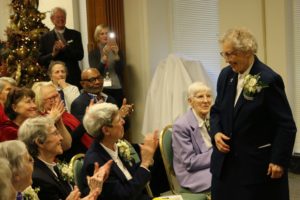 “We were in a little village in Switzerland. There was this church that had this magnificent organ,” Monsignor Humbrecht recalled. “We’re walking around it, and Sister starts thinking, the wheels are turning, ‘I wonder if I can play that.’ The docent who was giving us the tour said, ‘Oh, Sister. I can’t give that permission. I have to call the head organist.’ So, he did. The head organist came and talked with Sister. Sister sat down and played a beautiful piece on that organ, and he applauded when she was finished because that was a gift she had, too, and she shared that gift so beautifully.”
“We were in a little village in Switzerland. There was this church that had this magnificent organ,” Monsignor Humbrecht recalled. “We’re walking around it, and Sister starts thinking, the wheels are turning, ‘I wonder if I can play that.’ The docent who was giving us the tour said, ‘Oh, Sister. I can’t give that permission. I have to call the head organist.’ So, he did. The head organist came and talked with Sister. Sister sat down and played a beautiful piece on that organ, and he applauded when she was finished because that was a gift she had, too, and she shared that gift so beautifully.”
After Communion, Sister Albertine’s brother, T.J. Paulus, shared memories of his sister and their parents, the poet and educator Albert Paulus and his wife, Ella. The Pauluses were married 66 years and lived into their 90s as well, Albert dying at 99 and his wife at 93. The Paulus Room worship area at St. John XXIII Catholic Center on the University of Tennessee campus in Knoxville is named for them.
T.J. Paulus said his sister entered the Mercy convent in February 1949.
“She was well-educated with a BS and an MS in mathematics from Edgecliff College and a master’s of pastoral studies from Loyola University,” he said. “She taught for 32 years, much of it mathematics. From 1986 to 2009, she served as the director of the Diocese of Nashville Renew program, a parish renewal program. My wife, Sue, and I led a small group of about 10 people. This was a powerful spiritual experience. Sister Albertine started leading student trips in 1971. In 2000, she was invited to be involved in the diocesan pilgrimages. She led about 30 pilgrimages over the years. Sue and I went with her on four of them: Rome for the 2000 Jubilee Year, the Holy Land, the Footsteps of St. Paul in Greece and Turkey, and to Poland and Germany.”
Mr. Paulus read poems written by his father and letters by and about Sister Albertine as she was entering religious life.
“Our mother and father, Albert and Ella Paulus, were excellent at keeping family memorabilia,” Mr. Paulus said.
Father Nolan sang the “Celtic Song of Farewell” at the end of Mass.
“Before the final prayer,” Monsignor Humbrecht said, “I’d like to ask that we take a moment as each one of us here has our own special memory of Sister Albertine. I want to share one by chaplain Dan Hicks, who Sister worked with at the hospital: ‘There was something indomitable about Sister Albertine. No hesitancy, no equivocation. She was a smart, open-hearted, generous force, a servant, single-minded in her commitment to do the good God called her to do and to do it with all her considerable might. Sister Albertine will live in my memory as a passionate, joyful soul, her stunning lifetime, daring to believe that with God’s help she could change the world, and I’m certain she did.’”
Monsignor Humbrecht remembered Sister Albertine’s longtime friend, the late Sister Madaleva Partenope, RSM.
“I want to share the vision that I conjured in my mind of what it was like when she and Sister Madaleva got back together again in heaven,” he said. “I’m sure that was a raucous gathering. I invite all of you in a moment of silence to recall your special memory and to thank God for that memory.”
Sister Albertine was born July 18, 1929, in Ithaca, N.Y. She grew up in Knoxville, playing the organ starting in fifth grade and becoming the parish organist at Immaculate Conception Church in Knoxville at age 13, and attended the University of Tennessee for a couple of years before entering the Sisters of Mercy. Her day of profession was Aug. 16, 1951.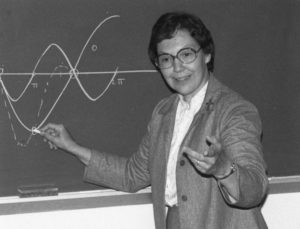
Her long teaching career followed, as did her association with St. Mary’s Medical Center in Knoxville, where she lived at the Mercy convent for many years. She could frequently be found visiting patients at the hospital, often accompanied in later years by Sister Martha.
She was founding director of the Office of Evangelization in 1989 and served in that role until 2009, welcoming thousands of people into the Catholic Church through the RCIA programs her office oversaw.
In recognition of her dedicated work in areas of evangelization, Sister Albertine received the prestigious honor of the Cross Pro Ecclesia et Pontifice, which means “for church and pontiff,” in 2006.
Sister Albertine was preceded in death by her parents and her brother, Jim Paulus. She is survived by brother T.J. and wife Sue Paulus, sister-in law Sue Paulus, seven nephews, a niece, great-nieces and great-nephews, and a great-great-niece as well as her cherished community of the Sisters of Mercy.
A private funeral was held at Mercy Convent in Nashville, followed by burial in Calvary Cemetery there.
Sister Albertine celebrated major anniversaries with the Sisters of Mercy, including her 50th in 2001 and 55th in 2006. On the occasion of the latter anniversary, she was asked what she was most thankful for. “That God saw fit to invite me. I’m just in absolute gratitude to God,” she said.
Sister Albertine also said what she enjoyed most about being a Sister.
“I just enjoy it all,” she said. “I do have responsibilities, and some of them are very heavy, but it’s almost like I’m on this track where God put me, through no real effort of my own. I promised to do what I was told and go wherever I’m sent according to our constitution. If I do that, I’m fine.”
The call to become a Sister came early, Sister Albertine said.
“I knew I’d end up a Sister from the time I was in third or fourth grade,” she said. “I didn’t have any idea how it would happen; I just knew it. I suppose my parents [inspired me], not because they talked about it, but they each had a sibling who was a Sister, so it wasn’t a foreign thing. I knew early on, and I wanted to give my life to God.”
Bishop Richard F. Stika came to know Sister Albertine when he became Knoxville’s third shepherd in 2009.
“Sister Albertine will be greatly missed,” he said. “She shared her wisdom and talent with so many—serving the St. Mary’s Hospital system, the Diocese of Knoxville, and the numerous, faithful pilgrims throughout East Tennessee. Join me in prayer that Sister Albertine is now enjoying the beatific vision.”
Archbishop Joseph E. Kurtz, Knoxville’s second bishop, also remembered Sister Albertine.
“I just wanted to share that I have very fond memories of Sister Albertine, and I pray for her, her family, and all her beloved Sisters of Mercy,” he said.
Sister Martha recalled her good friend.
“Sister Albertine always maintained strong relationships with her family and friends,” she said. “When the challenges of illness summoned her in new ways, she profoundly touched our hearts by her fidelity, love, and tenacious spirit. We will miss her in so many ways!”
Ed Miller, founding editor of The East Tennessee Catholic, knew Sister Albertine well as they worked together for many years after he started the newspaper in 1991. The Mercy Sister could often be found late nights at the Chancery office, long after her co-workers had left for the day.
“Sister Albertine was one of the most wonderful women I’ve known in my life,” Mr. Miller said. “She was an amazing, amazing person. She inspired many, many people, including me.”
Father Vick said his association with Sister Albertine went way back, to his days at the school run by the Sisters of Mercy at Immaculate Conception Church in downtown Knoxville.
“All my life, literally, since St. Mary School. She was not my teacher, but she was around. The Sisters of Mercy had mercy and they let me out at sixth grade,” he said.
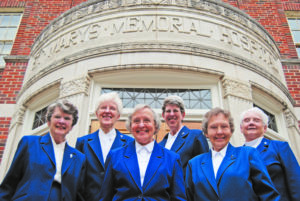 “She’s actually a hero in the best sense of the word, because she lived her faith. She was a very human person. Put those things together—she was very Jesus-like to me. She knew what she was doing. She had faith in herself to literally help change the world, and she did, one person at a time. And that’s a pretty inspiring thing. Friend, mentor, teacher—the list goes on, but really a good guide in life.”
“She’s actually a hero in the best sense of the word, because she lived her faith. She was a very human person. Put those things together—she was very Jesus-like to me. She knew what she was doing. She had faith in herself to literally help change the world, and she did, one person at a time. And that’s a pretty inspiring thing. Friend, mentor, teacher—the list goes on, but really a good guide in life.”
Lisa Morris, who leads diocesan pilgrimages now, knew Sister Albertine well.
“She was a blessing to me and so many, and I will be forever grateful to God and to her for all she gave and did for so many,” Mrs. Morris said.
“I went on my very first pilgrimage with Sister Albertine almost 20 years ago in 2003 to the shrines of France, and it was life-changing for me. I learned so much from her over the years, and many of the handouts I use in the pilgrimage packets today are from her. She was always there for everyone and led us closer to God, the Church, and each other through her ministry of pilgrimages. And I am so thankful to her and the diocese for being able to serve in this way. Her pilgrimage is continuing in heaven for eternity. I can only imagine the joy she has as she comes face to face with Our Lord, Mother Mary, the angels and saints, and all who have gone before her. From my heart to yours, thank you, Sister Albertine. May you rest in peace,” Mrs. Morris added.
Brigid Johnson, director of faith formation at Immaculate Conception, was a student at Edgecliff College when Sister Albertine was there.
“Sister Albertine took me to my first Baptist church,” Mrs. Johnson said. “One of the maintenance men at the college had died suddenly, and Sister decided that we needed to form a delegation and go to his funeral. I think she might have made us sing, too, but that memory is kind of fuzzy. I just remember being introduced to a very different culture and how she had given us the opportunity to understand and appreciate it.”
Mrs. Johnson also formerly worked at the Chancery alongside Sister Albertine.
“She talked me into laundering the altar linens from the Chancery,” Mrs. Johnson said. “You have to soak the purificators to get the wine stains out, and that water has to go into the soil. I used it to water my house plants and was amazed at how well they were doing. I told Sister that it must be the holy water and, being the pragmatist that she was, she pointed out that perhaps it was because they were now getting watered more regularly.”
At the end of the funeral Mass, Monsignor Humbrecht related one last memory of Sister Albertine.
“Sister Martha shared with me that a few days before Sister Albertine died, a six-point stag came up to her window in the infirmary and stood there,” he said. “I thought when Sister told me that of Psalm 142: ‘The deer that yearns for running streams, O Lord, so my soul longs for you.’ I think that was Sister Albertine, one of her last prayers: ‘Lord, I’m longing to come home. My soul yearns for you now.’ And then she was gone. That’s what Sister was. She was a torch, a light, leading us on the way, and for that today we say thank you, God.”

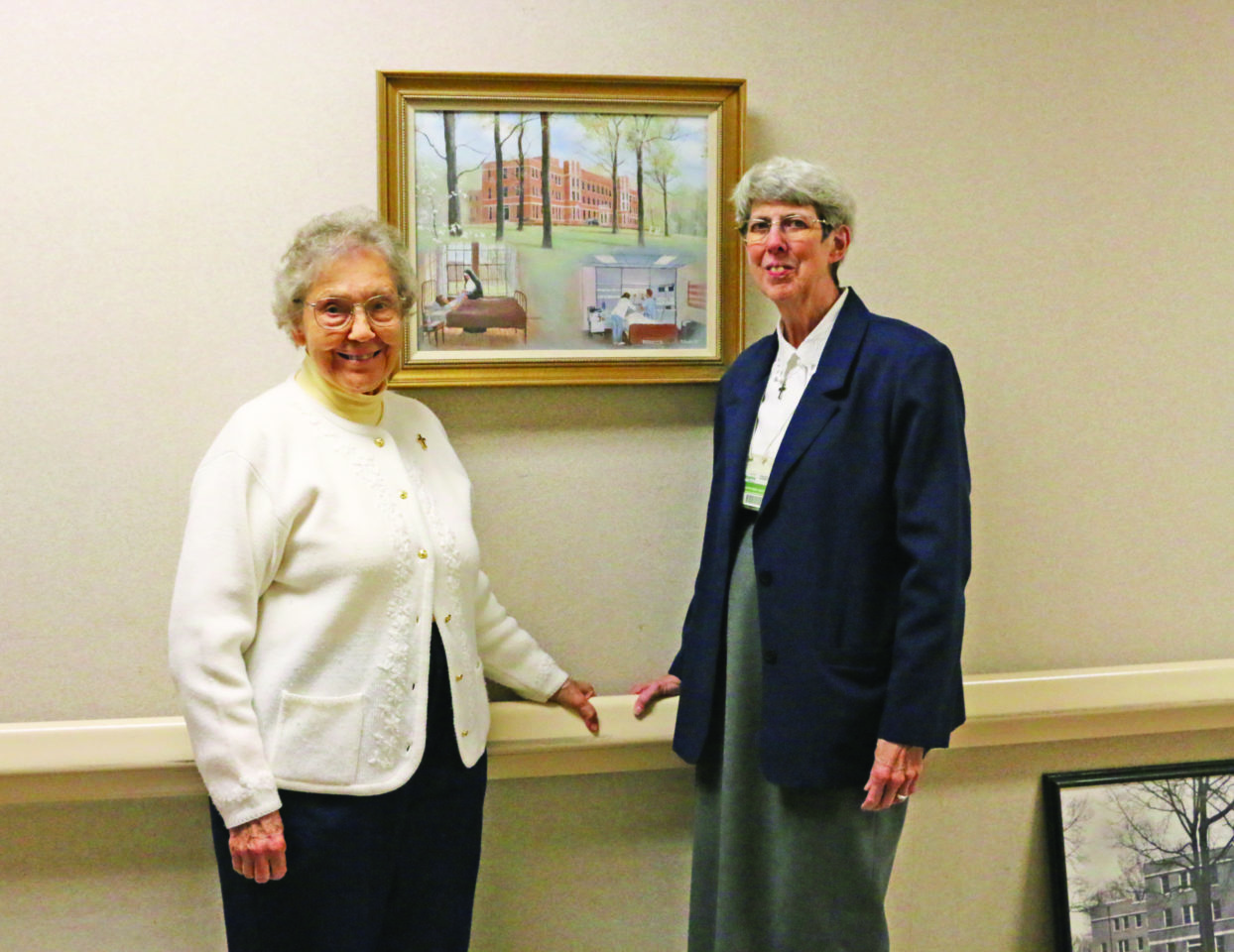
Comments 1
Rest in Peace, Sister Albertine. You were special to many,especially those of us who you served at St Mary’s Medical Center!
Ginni Foust